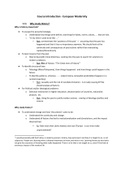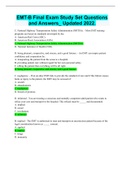Summary
Summary Complete SUMMARIS of Chapters 1 and 2 of 'European History' (Ba1 Social Sciences, Prof. Dr. Musliu)
- Course
- Institution
These files are complete, organized and simplified smmaries of chapters 1 and 2 of the extensive material of the course of 'European History' taught by Prof. Dr. Musliu. The two chapters summarized here are entitled: "Introduction, European Modernity" and "Interpreting the French Revolution". I got...
[Show more]




